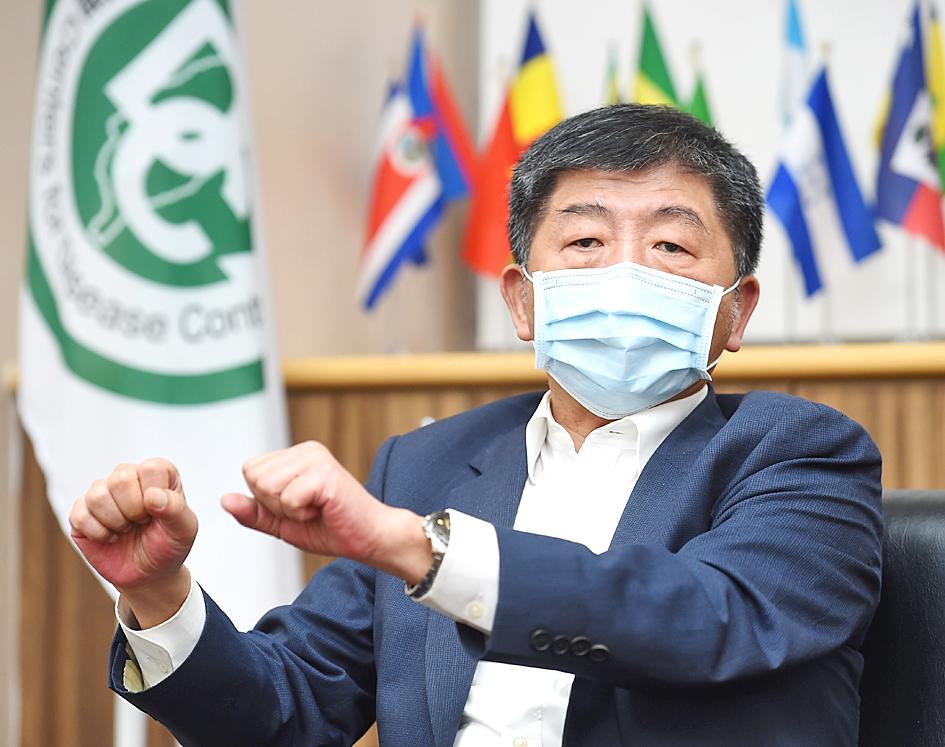The COVID-19 pandemic has shown that the nation’s medical system must be bolstered to shoulder disease prevention duties ranging from border controls to aiding local communities, Minister of Health and Welfare Chen Shih-chung (陳時中) said.
Chen, who heads the Central Epidemic Command Center, made the remarks in an interview with the Liberty Times (sister newspaper of the Taipei Times) on Friday.
Disease prevention efforts should not have to erode the provision of medical resources to the public, Chen said.

Photo: Liu Hsin-de, Taipei Times
A majority of Taiwan’s medical industry is in private hands and benign competition keeps the industry at peak efficiency, he said.
“However, being overly efficient might become a problem during pandemics, as the extra work — piled on an already heavy workload — lowers the original capability the industry could have offered,” Chen said.
Giving an example, Chen said the US medical system is strong and efficient, but as can be seen during the pandemic, most of it has closed down, collapsing under the weight of epidemic prevention, an influx of COVID-19 patients and other severe illnesses.
Likewise, Taiwan’s medical system is wound too tight and its focus on peak efficiency would mean that when the time comes, its peak performance would be insufficient, Chen said.
One method of resolving this issue is to boost government involvement, Chen said, adding: “We must leave room to do more, when it is necessary.”
Regarding the improvement of disease prevention institutions, Hospital and Social Welfare Organizations Administration Commission Director Wang Pi-Sheng (王必勝) said that besides sufficient funding and staff, public hospitals are in urgent need of systemic reforms.
Public hospitals are comprised of ministry-operated hospitals, military hospitals, veterans’ hospitals, university-affiliated hospitals, and county or city hospitals, but they cannot collaborate, as they operate under different hierarchies, he said.
If these could be integrated or grouped under an independent bureau-level organization, their overall efficiency would increase, Wang said.
Turning to the issue of overseas Taiwanese visiting Taiwan to use the nation’s medical resources, while a majority of COVID-19 cases having been imported from abroad, Chen said that most coronavirus patients are being treated using state funding and are not related to the National Health Insurance (NHI) program.
However, the pandemic has highlighted a problem in the NHI system, which is insufficient funding, he said.
Some have called for raising NHI premiums, but they must realize that there would be a certain amount of wastage, as the NHI uses a third-party payment system, Chen said.
For some, the waste is intentional, but for others, it is an institutional problem, he said, adding that if the premiums are raised too much, it would hurt those who have done nothing wrong.
Whether the system should be changed and what changes need to be made should be discussed, he added.
Additional reporting by Lin Hui-chin

Taiwan is stepping up plans to create self-sufficient supply chains for combat drones and increase foreign orders from the US to counter China’s numerical superiority, a defense official said on Saturday. Commenting on condition of anonymity, the official said the nation’s armed forces are in agreement with US Admiral Samuel Paparo’s assessment that Taiwan’s military must be prepared to turn the nation’s waters into a “hellscape” for the Chinese People’s Liberation Army (PLA). Paparo, the commander of the US Indo-Pacific Command, reiterated the concept during a Congressional hearing in Washington on Wednesday. He first coined the term in a security conference last

Prosecutors today declined to say who was questioned regarding alleged forgery on petitions to recall Democratic Progressive Party (DPP) legislators, after Chinese-language media earlier reported that members of the Chinese Nationalist Party (KMT) Youth League were brought in for questioning. The Ministry of Justice Investigation Bureau confirmed that two people had been questioned, but did not disclose any further information about the ongoing investigation. KMT Youth League members Lee Hsiao-liang (李孝亮) and Liu Szu-yin (劉思吟) — who are leading the effort to recall DPP caucus chief executive Rosalia Wu (吳思瑤) and Legislator Wu Pei-yi (吳沛憶) — both posted on Facebook saying: “I

The Ministry of Economic Affairs has fined Taobao NT$1.2 million (US$36,912) for advertisements that exceed its approved business scope, requiring the Chinese e-commerce platform to make corrections in the first half of this year or its license may be revoked. Lawmakers have called for stricter enforcement of Chinese e-commerce platforms and measures to prevent China from laundering its goods through Taiwan in response to US President Donald Trump’s heavy tariffs on China. The Legislative Yuan’s Finance Committee met today to discuss policies to prevent China from dumping goods in Taiwan, inviting government agencies to report. Democratic Progressive Party Legislator Kuo Kuo-wen (郭國文) said

The Ministry of Economic Affairs has fined Taobao NT$1.2 million (US$36,900) for advertisements that exceeded its approved business scope and ordered the Chinese e-commerce platform to make corrections in the first half of this year or its license would be revoked. Lawmakers have called for stricter supervision of Chinese e-commerce platforms and more stringent measures to prevent China from laundering its goods through Taiwan as US President Donald Trump’s administration cracks down on origin laundering. The legislature’s Finance Committee yesterday met to discuss policies to prevent China from dumping goods in Taiwan, inviting government agencies to report on the matter. Democratic Progressive Party